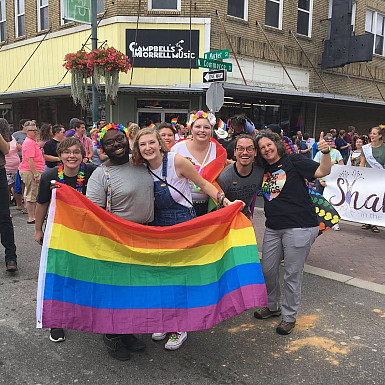Degrees & Requirements
“It is not enough to be compassionate. You must act.”
- His Holiness the Dalai Lama
About the Minor:

The minor in Peace & Social Justice Studies will equip you for a life of service, a productive career, and global citizenship by giving you the theoretical and practical skills to think about, advocate for, and navigate conflict nonviolently, underscored by an exploration of different conceptions of justice; diversity and multiculturalism; and our shared existence in a globalized world.
This interdisciplinary and experiential minor will draw from several disciplines, including civic innovation, sociology, politics, and philosophy. Your experience in the minor will culminate in an internship experience with a local peace and justice organization.
Minor Requirements:
As a Peace and Social Justice Studies student, you will move through the following course of study to complete the minor: PJST 100; PJST 200 or 205; CVIN 200 or 205; SOCI 221, 241 or POLS 215; PHIL 341; PJST 400. Below is a full listing of courses and their descriptions.
PJST 100 – Introduction to Peace and Social Justice: Exploration and survey of the fields of peacebuilding, conflict resolution, nonviolence, and social justice. Students will explore and become familiar with the theoretical frameworks of peacebuilding and social justice; articulate arguments for and against various approaches; and consider their own applications and praxis in the field. Three semester hours.
PJST 200 – Nonviolence and Conflict Resolution: Examination of various theories and approaches to nonviolent action, including but not limited to civil disobedience, economic actions, and other disruptive tactics; and, examination of various theories and applications of nonviolent conflict resolution. Students will explore these topics through historic and contemporary examples through the study of social action in India, South Africa, and the United States. Three semester hours.
-OR-
PJST 205 – Peacebuilding in a Globalized, Multicultural World: Examination of the theories and approaches to peacebuilding and social justice through feminist, indigenous, Global South, and non-Christian perspectives, with attention to the applications and implications of such theories in multicultural settings. Three semester hours.
CVIN 200 – Public Movements and Social Change: Drawing from efforts for social and cultural change across regional, national, and international contexts, students apply key lessons and strategies to specific contemporary issues and questions, emphasizing the development of innovative ideas and building support for them. Students understand the difference between policy driven innovation and change and citizen driven innovation and change, particularly in the Appalachian context, and assess the effectiveness of those change efforts based on outcomes. Three semester hours.
-OR-
CVIN 205 – Alliances for Innovation: As part of an ongoing major project, student teams effectively organize and mobilize citizens to take on collaborative work that innovatively addresses community needs to achieve tangible results. Teams develop result leaders, recruit participants, negotiate instances of conflict, and identify and learn from mistakes. Civic Project: Organizing Collaborative Work. Four semester hours.
SOCI 221 – Cultures and Peoples: Characteristic cultural features, social organizations, and special problems associated with populations in different areas of the world. Varying focus from year to year, including East Asia, Native Americans, and African Americans. This course satisfies the International Exploration requirement. Three semester hours.
-OR-
SOCI 241 – Social Stratification: Examines leading perspectives and theories in the subfield of social stratification with attention to the distribution of income and wealth nationally and globally. Other topics covered include class mobility, an exploration of the institutions through which class inequality and mobility are structured and reproduced such as the family, education, and the criminal justice system, and the role of political power in determining the distribution of resources. Three semester hours.
-OR-
POLS 215 – Introduction to Comparative Politics: Basic theories and issues in the field of Comparative Politics, issues of economic development and regime type, reasons why different countries work under different political institutions, and the benefits and shortcomings of different institutional configurations. Important political and social issues analyzed from a comparative perspective. This course satisfies the Modes of Inquiry requirement for Understanding the Individual and Society. Three semester hours.
PHIL 341 – Contemporary Problems of Justice: Examination of contemporary political philosophy and its application to key questions of justice in contemporary political life. This course satisfies the Modes of Inquiry requirement for Understanding the Individual and Society. Three semester hours.
PJST 400 – Capstone Internship and Seminar: Grounded in a rigorous internship experience with a local peace and social justice organization, students will synthesize their learning in the minor through readings and discussions, with particular attention given towards the implications of their learning as it relates to their roles in communities and careers. Three semester hours.